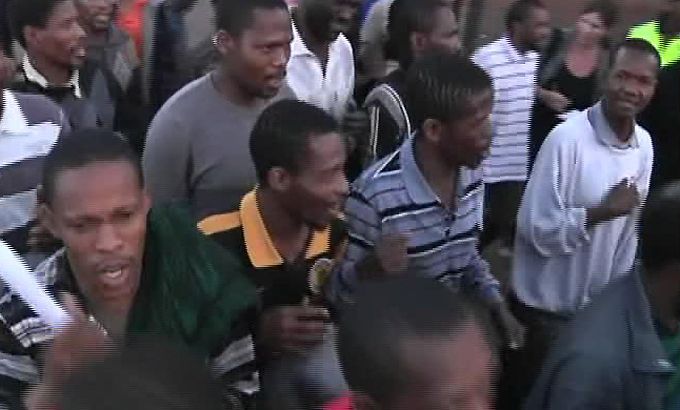S Africa’s Malema faces incitement charges
Trade union says ex-ANC youth leader capitalising on Marikana mine tragedy “to further his own political agenda”.

A South African union has filed criminal charges against Julius Malema, the former leader of the ruling party’s
youth league, for inflaming tensions at mines hit by unrest.
Solidarity, a trade union which largely represents white, skilled workers, laid charges of incitement to public violence and intimidation against Malema at a police station near Pretoria on Wednesday.
Keep reading
list of 4 items‘We need you’: Solomon Islands’ support for US agency’s return revealed
Why are nations racing to buy weapons?
Parallel economy: How Russia is defying the West’s boycott
Malema, who was drummed out by the African National Congress (ANC) for ill-discipline earlier this year, has capitalised on violent strikes at South Africa’s mines to take potshots at foes such as President Jacob Zuma and push his radical views on nationalising mines.
| Marikana In depth |
 Can Zuma survive? Can Zuma survive? Mine Shooting: Who is to blame? Mine Shooting: Who is to blame? Unrest spreads Unrest spreads Mourning over mine deaths? Mourning over mine deaths? |
“Violent protests at mines are not spontaneous. He encourages violence for his own gain. Malema is an opportunist who uses unrest to try to revive his political career,” Johan Kruger, Solidarity spokesman, said.
Travelling to troubled mines, Malema has fired up worker frustrations with calls for mines to be made “ungovernable”, on which Solidarity blamed this week’s violence at a Gold One mine where rubber bullets were fired and four people injured.
Malema also visited the platinum producer Lonmin’s Marikana mine, where a deadly illegal strike has killed 44 people.
“He continues to attempt to capitalise on the Marikana tragedy to further his own political agenda,” Kruger said.
The development came several hours after more than 1,000 striking miners demonstrated at the Marikana mine, which is located in the North West province.
Dozens of police arrived at the scene while a helicopter hovered above the protesting rock-drill operators, whose strike to demand a hefty pay hike is now in its fourth week, crippling Lonmin.
Demand for pay rise
One man at the front of the column waved a placard reading “We want 12,500 or nothing else”, a reference to the group’s demand for an increase in base pay to $1,500 a month, more than double their current salary.
Another protester, who did not wish to be named, said the demonstrators were heading to Lonmin’s nearby Karee mine to “take out the people who are working in the mine shaft”.
Al Jazeera’s Tania Paige, reporting from Marikana, said: “People are in a good mood, people have broken from two police barricades, they are demanding their bosses at Lonmin … speak to them.”
|
Al Jazeera’s Mike Hanna analyses the mine strikes |
“The miners are trying to invigorate their campaign – after incidents of the past two weeks.”
However, at the Gold Fields KDC East mine in Johannesburg, the scene of violence on Tuesday, workers agreed to go back to work.
Lesiba Seshoka, spokesperson for the National Union for Mineworkers (NUM), told Al Jazeera that the 12,000 miners striking at the mine had agreed to go back to work tonight.
“They have agreed to go back to work when their shift begins tonight,” he said.
“They have managed to highlight their concerns and this is important.”
The violence spread to Johannesburgon Tuesday, with police and security guards firing rubber bullets and tear gas at sacked gold miners who have been blocking colleagues from working, officials and police said.
The workers have been striking and protesting against a new funeral benefit and the union branch leadership since Wednesday last week.
The clash at the mine was the latest violence to hit South Africa’s mines in months of unrest.
Judicial inquiry ordered
The government has apologised for the violence and a judicial inquiry investigating the violence is to report to Zuma by January.
South Africa has been rocked by mining violence since August 16 when police shot and killed 34 striking workers at Lonmin’s Marikana mine. They were demanding a 300 per cent pay rise.
Days before the fatal shooting, 10 people, including two police officers, were killed in violence at the mine.
After apartheid ended in 1994, South Africa pressed to share the country’s vast mineral wealth with its impoverished black majority. But the hoped-for result has not occurred.
World platinum prices have risen more than 10 per cent since the August 16 shooting, while Lonmin’s Johannesburg- and London-listed shares have lost more than 15 per cent of value.